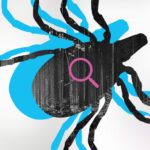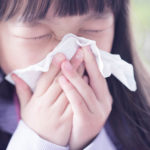Spring into good health: Tips for allergies, poison ivy, and tick bites

Spring is here — and so are allergies, poison ivy, and ticks carrying Lyme disease. But that doesn’t mean your family shouldn’t embrace springtime. Here are some tips to help your child best control allergies and avoid (and treat, if necessary) poison ivy and tick bites.
Simple steps and home remedies can tame allergies
Managing spring allergies doesn’t have to be an uphill battle. All it takes are a few easy measures to lessen symptoms:
- Have your child wear a hat and sunglasses to prevent pollen from getting in their eyes.
- When your child comes indoors, have them remove their clothing so you can wash it and remove allergens.
- Leave shoes at the door so your family doesn’t track allergens through your home.
- Wash or ask your child to wash their hands and face when they come inside to remove allergens from their skin.
- Before your child goes to bed each night, ensure they fully bathe and shampoo their hair. This will keep pollen off their bedding.
- Use cool compresses to relieve your child’s itching or stinging eyes.
- If your child has severe allergies, encourage them to stay indoors on days with high-pollen counts.
- Close all windows and, if you have it, turn on air conditioning in your home and car to help remove allergens from the air.
Start allergy medicines sooner rather than later
If your child has a history of seasonal allergic rhinitis (a reaction to breathing in something they are allergic to) start medication before their symptoms develop. It’s much easier to prevent allergy symptoms than to relieve them once they’ve appeared.
Your doctor may recommend these allergy medications to prevent or manage symptoms:
- antihistamines (in a pill or eye drops) to block histamine, a chemical the body releases when exposed to a trigger
- nasal corticosteroids to reduce inflammation in the nasal passages
- a “quick-relief” asthma inhaler to halt sudden asthma attacks and an anti-inflammatory controller inhaler to improve overall control of asthma
Managing spring allergies and illness
Chronic nasal congestion from allergies makes it difficult to clear germs from the nose, and if your child catches a virus, it can linger there. Talk to your pediatrician if you notice symptoms that don’t respond to allergy medications.

Prevent the spread of poison ivy
Exposure to any part of a poison ivy plant can cause a rash, but not everyone is allergic. Children who are allergic should recognize the plant and avoid it completely. Consider explaining to your child the old saying: “Leaves of three, let it be!”
How to treat poison ivy at home
Treatment depends on the severity of the rash. A poison ivy rash isn’t contagious, but it can spread as long as plant oil remains on hands or clothing. The longer the exposure, often the worse the rash.
If you suspect poison ivy exposure:
- Bathe your child as soon as possible.
- Wash clothing and pets that might have brushed against the plant.
- Treat patches of poison ivy rash smaller than six inches on your child’s legs, arms, chest, back, neck, and shoulders with over-the-counter hydrocortisone 1-percent ointment, twice daily.
- If your child has poison ivy on their face or genitals, call your pediatrician as soon as possible.
- Give your child Benadryl to relieve itching.
Protecting your child from ticks and Lyme disease
Ticks begin to hatch as soon as the ground thaws. The early spring nymphal deer tick can be as small as a millimeter. Check your child for ticks each night before bed. Look everywhere; ticks love warm dark places like skin folds and the scalp.
Remove a tick by grasping it firmly with tweezers as close to the skin as possible and pulling it straight out. To transmit Lyme disease, a tick must be attached for more than 36 hours.
Look for symptoms of Lyme disease
- a red flat rash that expands rapidly — the rash may look like a bull’s-eye, but not every child with Lyme disease will have a rash
- fever
- headache
- muscle and joint pain
- generalized fatigue
Call your pediatrician immediately if you suspect your child has Lyme disease. (You don’t need to keep a tick that has been removed from your child.) If the pediatrician suspects Lyme disease, they will prescribe antibiotics.
Learn about the Allergy and Asthma Program or make an appointment.
Related Posts :
-

Q and A: What you need to know about ticks and Lyme disease
With summer on the way, you and your family will probably be spending more time outdoors. You may be taking ...
-

Addressing inequities in asthma by focusing on children’s environments
Asthma strikes children in low-income urban areas especially hard, more often sending them to the hospital. For more than 20 years, ...
-

Trial for severe asthma targets a mutation common in children of color
Children and adults of color have higher rates of asthma than white people, as well as more hospitalizations and deaths. ...
-

What every family should know about RSV
To help keep your family safe and informed about respiratory syncytial virus (RSV), we spoke to Dr. Kathleen Conroy, Clinical ...





